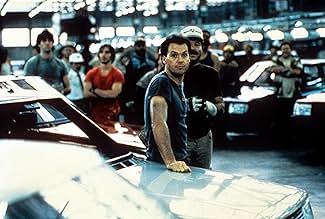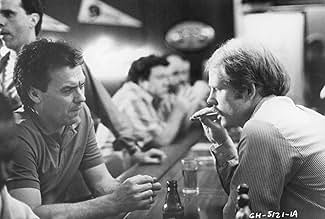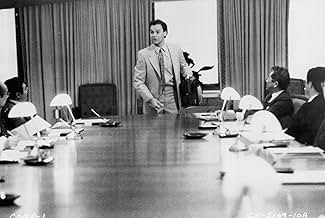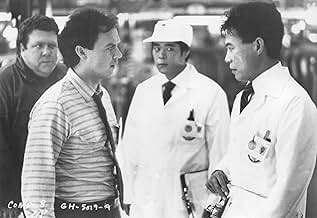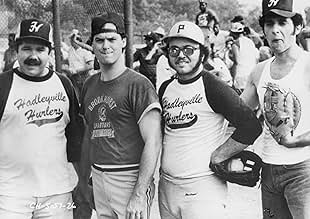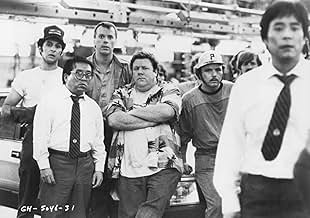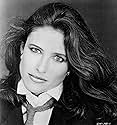Hunt Stevenson convainc une entreprise automobile japonaise de s'implanter à Hadleyville, en Pennsylvanie. Très vite les méthodes managériales des nippons se heurtent aux habitudes de travai... Tout lireHunt Stevenson convainc une entreprise automobile japonaise de s'implanter à Hadleyville, en Pennsylvanie. Très vite les méthodes managériales des nippons se heurtent aux habitudes de travail américaines.Hunt Stevenson convainc une entreprise automobile japonaise de s'implanter à Hadleyville, en Pennsylvanie. Très vite les méthodes managériales des nippons se heurtent aux habitudes de travail américaines.
- Réalisation
- Scénario
- Casting principal
- Récompenses
- 1 victoire au total
- Mr. Sakamoto
- (as Soh Yamamura)
- Umeki Kazihiro
- (as Patti Yasuiake)
Avis à la une
Not having seen this film until recently, I saw another aspect of it - satire. But it seems not to have been so obvious to others. I can't find anything on the Web that says director Ron Howard intended "Gung Ho" as a satire. So, one doesn't know if he planned it that way or not. What one is left with is a typical comedy of the late 20th century. It lampoons people, places and things in the name of comedy.
So, what to make of "Gung Ho" as a comedy -- or satire? It's crude, it highly exaggerates, and it portrays bigotry. But, portraying bigotry is not the same as being bigoted. Especially where the film lampoons aspects of both Japanese and Americans, their respective cultures of the time, and their work ethics.
And, with that, the film clearly throws political correctness to the wind. For the most part, lampooning PC is good and healthy because it had been carried to such extremes by the end of the last century. The specter of a "thought police" loomed in the future. So, PC itself often clashes with aspects of freedom and liberty, as well as common sense.
Of course, the idea of devotion to the company above all else makes industry a god. And the film clearly shows how the humanity of mankind suffers then, in the families and social structure. I like the undertone of this plot that compares individualism with team work. It points out the strengths of both, and their shortcomings. Its conclusion is very appropriate for a healthy - and happy, society.
If one can see the offsetting poking of fun at the Americans and Japanese in this film, a little lesson emerges about the need for society to get along, and to accept and appreciate our many differences. There's a little of the ugly American in here in George Wendt's meanness with the Japanese manager's wife in the super market. But there's also a depiction of American failure. Again, Wendt's character, Buster, is the source when he argues with a Japanese supervisor on the auto assembly line about allowing occasional flaws to go through. That, indeed, was a striking difference that was at the heart of the Japanese recovery from World War II.
I don't know if anyone connected with this film in 1986 was familiar with that history and how the Japanese industrial supremacy came about. It started in 1950 with a Wyoming-raised American statistician and engineer by the name of W. Edwards Deming. I was fortunate to have attended a talk by Deming in the early 1970s in Washington, D.C., when he related his work with the Japanese to help their industries and economy recover after the war. For his mostly non-scientific members of the audience, Deming kept it very simple. I can never forget his ball bearings example. It was based on his actual statistical studies.
It went something like this. For every 1,000 steel ball bearings that American car makers had been using for wheels, three would be defective. They might be flattened and not perfectly rounded from a flaw at the ball bearing plant. Most wheel bearings will last 100,000 miles or more. But those cars that got wheels with faulty bearings would have wheel problems after just a few thousand miles. Deming used this example with Japanese companies to convince them to single source their suppliers and use zero defects checking up front. By applying this and other principles he used, the Japanese auto industry soon eliminated early car operating problems in all areas.
The result was automobiles that were far more efficient, trouble-free and well made than American cars that had held market sway for decades. Since the early 1980s, Japanese autos have set the standards for quality and workmanship. American and European car makers have been playing catch-up ever since.
So, there's considerably more to this film than a slangy, mocking comedy. One suspects that the director and writers knew and intended that all along. But, packaging it the way they did, it would have some appeal as raw and crude comedy that was something of a fad among many - but not all, movie buffs of that time.
As the reviewers to date indicate - indeed, as with many movies, some viewers may like "Gung Ho" while others may think it's quite bad. Those who haven't yet watched it and may be considering it, should take these things into account.
The last thing that should be mentioned as worthy of note is the acting. There's nothing above average by the American actors -- except for Michael Keaton. He nails the character of Hunt Stevenson, whether one likes him or not. And, Gedde Watanabe is superb as the perplexed, conflicted plant manager, Oishi Kazihiro. Most in the Japanese cast are very good.
Had this movie been made more clearly as a satire, it could have been very enjoyable and entertaining. By thus quashing its otherwise bigoted tone, it could have earned a couple more stars than the six I give it.
Here are some favorite lines. . Hunt Stevenson, "You know, the amazing thing is, I'm not even nervous." Audrey, "Babe?" Stevenson, "Yeah?" Audrey, "You just put your garbage in my car."
Oishi Kazihiro, "You're right! You're right!" Hunt Stevenson, "I am? Are you shittin' me?" Kazihiro, "No. You are in much more trouble than me. Ah ha, ha, ha. I feel much better."
Oishi Kazihiro, after Hunt follows him into the river, "I'm not drowning myself. I'm just freaking out."
Come back with me, children, to a time when Michael Keaton was a straight-up comedy guy, and you might find some joy in this film. It's a gentle comedy -- the kind Ron Howard specializes in -- but if that's your thing, you should check this out. Keaton's low-key charm is just right for this project.
"Gung Ho" is a bit dated, because it takes places in the last stage of the pre-global economy world, when it still mattered what country a business was based in. That said, it delivers laughs as well as a lesson on how people can learn from each other, to great benefit.
You could watch this film and enjoy it without remembering one scene in particular you really liked, but that's because the whole movie provides a slow but constant stream of laughs. It's like an I.V. drip. And I mean that in a good way.
There is plenty of comedy relief in the film, from culture clashes to slapstick humor. There's also bits of heroism in the film, including Hunt's town's survival being contingent on the car company staying afloat and including Japanese company manager Oishi Kazihiro (Gedde Watanabe) showing honor to his boss, colleagues and family in getting the car making job done.
Overall, an entertaining film with touches of Americana and Japanese cultures.
Grade B+
"Gung Ho" does a better job of capturing the mood of the American industrial workforce than just about any other popular movie made during that period. Certainly the movie has its flaws -- some loose plot threads and mediocre acting jobs by everyone except Michael Keaton and Gedde Watanabe. But the story really is about the meeting of East and West: Keaton's Hunt Stevenson personifies America, brash and confident on the outside yet insecure underneath. Watanabe's Kazuhiro personifies Japan, on top of the heap with a successful system, but wondering if there is more to be learned from their Western rivals. The movie's plot, flawed as it is, simply provides a framework for the conflict, and eventually synthesis, of their two personalities.
Keaton's acting overshadows everyone else's, and practically makes the movie by itself. I've always admired Keaton for his ability to deliver lines that feel improvised, no matter what script he's following. His character, Hunt Stevenson, is a likable, affable everyman, a natural leader with a wise-ass streak. But he has a fatal flaw common to many of us: he doesn't want to disappoint anyone. He'll distract the crowd with inspirational anecdotes, and even lie, rather than point out the ugly truth.
Kazuhiro is the mirror image of Stevenson: shy and introspective, but also, because of his Japanese upbringing, reluctant to be the bearer of bad news. The scene in which Stevenson first comes to Kazuhiro with the employees' grievances captures perfectly the Japanese approach to workplace conflict. Kazuhiro replies to Stevenson's complaints with "I understand what you are saying," but won't refuse his requests out loud. Stevenson misinterprets this as agreement, and goes away saying, "Okay, we've got that settled." (This is still a problem in Japanese-American business relations in the 21st century!)
Ultimately, Kazuhiro and Stevenson have the same problem: get the factory working smoothly, meet production goals, and fulfill their responsibility to the workers under them. In working towards this goal, they each have to take a page from the others' book. Kazuhiro's family becoming more "Americanized" is an obvious example. Also note that Stevenson thinks it's odd when Kazuhiro explains how he had to make a public apology to his workers for failing them -- and yet, later in the movie, Stevenson does exactly that himself.
The plot and its resolution are a little cornball, but hey, this is a comedy. If you can overlook the movie's flaws, there is a great story about self-realization and open-mindedness here.
Le saviez-vous
- AnecdotesAccording to Bloomberg Businessweek, Toyota executives later used the movie as an example of how not to manage Americans.
- GaffesWhen Hunt Stevenson meets the Japanese managers for the first time, they hand their business cards over with one hand. Japanese business protocol requires formally presenting business cards, holding them with both hands.
- Citations
Hunt Stevenson: If you walk out that door, you're going to miss a great comeback. We're ready to roll here, Jack.
Mr. Sakamoto: This will never be like a Japanese factory... *Jack.*
Hunt Stevenson: Oh, yeah? You're right. You know what else? So what?
Mr. Sakamoto: You failed.
Hunt Stevenson: Really? Wanna know something? I got one of the first cars ever made here. I got *the* first car ever - I don't think I want it anymore. As a matter of fact, here.
[hands keys to Mr. Sakamoto]
Hunt Stevenson: Why don't you take the keys, okay? I'd rather have one of those cars.
[points to cars in assembly line]
Hunt Stevenson: I'd rather have one of these cars that *we* made *together,* by hand. Your guys and my guys, together. You know why? Because those cars stand for something. Those cars stand for something pretty great. I'm proud of those cars. I'm taking one.
[Turns to workers]
Hunt Stevenson: Gentlemen, I'm going home in my new car!
[All workers cheer and applaud, then silently pray that Hunt's new car has a working engine. Hunt starts the car, and the workers cheer. However, the car literally falls apart after about two yards, and the workers start to moan. Hunter gets out of the car]
Hunt Stevenson: I tell ya, I thought it handled great!
- Versions alternativesSome international editions distributed by Paramount on DVD, reduced the aspect ratio from original 2.39:1 to 2.09:1.
- ConnexionsFeatured in Generation X: The Power of Disruption (2016)
- Bandes originalesDon't Get Me Wrong
Written by Chrissie Hynde
Performed by The Pretenders
Produced by Jimmy Lavine and Bob Clearmountain
Courtesy of Sire Records Company
Meilleurs choix
- How long is Gung Ho?Alimenté par Alexa
Détails
Box-office
- Budget
- 18 000 000 $US (estimé)
- Montant brut aux États-Unis et au Canada
- 36 611 610 $US
- Week-end de sortie aux États-Unis et au Canada
- 7 170 830 $US
- 16 mars 1986
- Montant brut mondial
- 36 611 610 $US
- Durée
- 1h 52min(112 min)
- Couleur
- Rapport de forme
- 2.35 : 1


